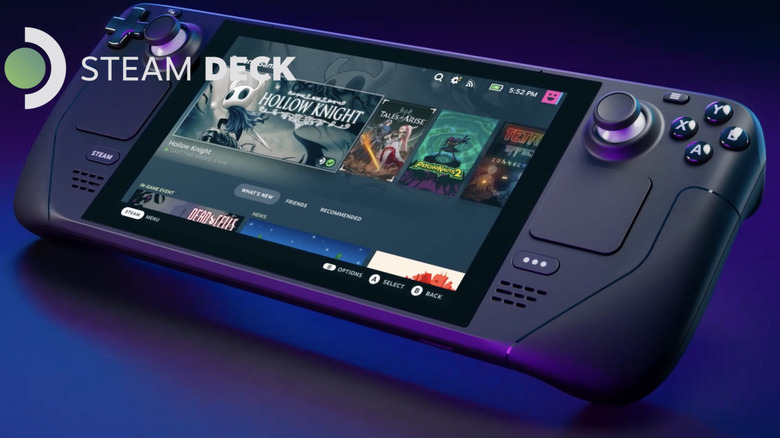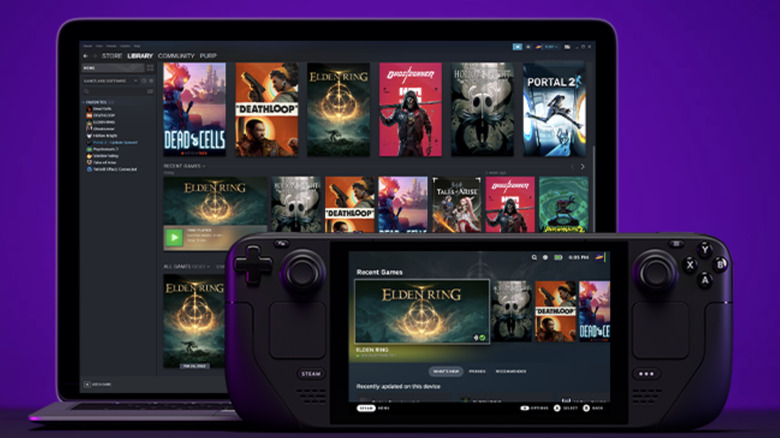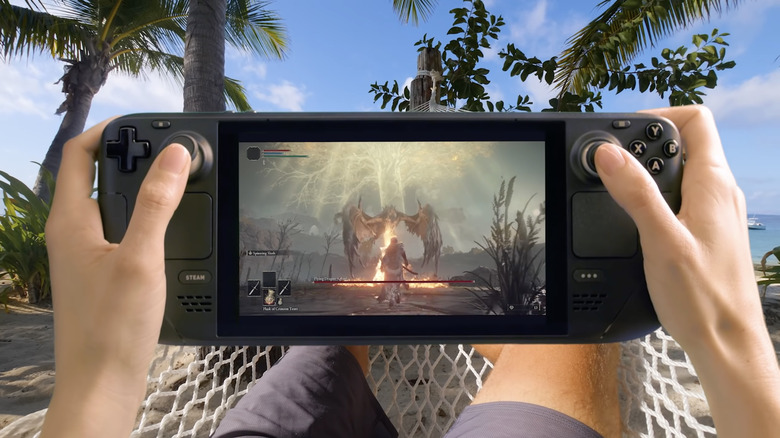The First Steam Deck Reviews Expose Some Big Surprises
After an unexpected delay, the Steam Deck is almost upon us and the reviews are rolling in. It seems as though Valve's handheld PC is making a big impression — in more ways than one.
Some of the system's pros and cons are fairly constant from person to person, but of course there's some wiggle room depending on everyone's own preferences and what they were expecting to get from the Steam Deck in the first place. The overall consensus is that it's a cool piece of gaming hardware that's a great way for Steam users to enjoy some of their games while traveling or even just detached from their PCs, as well as a good jumping off point for people who might be interested in exploring PC gaming for the first time.
That is, assuming they can get ahold of one. At the moment Valve has only started sending shipping notices to people who were able to reserve a Steam Deck back when that window was first opened in July of 2021, and even then it's going in reservation order. So if you weren't able to toss your lot in last summer you'll have to make a reservation through Steam and wait until – according to Valve – sometime in Q2 of 2022 for it to come in.
The Good
Most of the Steam Deck's positives have been unanimous, with Game Informer, Polygon, The Washington Post, and pretty much everyone else praising its ability to play so many games from their Steam libraries in a more portable fashion. And of course the portability itself has been a big talking point as the Steam Deck offers better performance, better visuals, and a more extensive selection than it's only real competitor: the Nintendo Switch.
Another common standout is the ability to thoroughly customize control layouts, thanks to the Steam Deck basically being a gaming PC mushed into a portable form. Similarly, most reviewers appreciate the overall build quality and the feel of most of the physical control buttons — particularly the control sticks, haptic pads, and gyroscopic options.
Then there's the Steam Deck's openness for customization and repair. Due to it being a gaming PC, as previously mentioned, users have the option to install additional apps or even a new operating system (it comes with Linux preinstalled), and by all accounts it's quite simple to expand the device's internal storage. And it's been designed with parts repair and replacement in mind — though Valve recommends that you don't actually do any of that yourself if you aren't familiar with hardware maintenance.
The Bad
There are also a few consistent complaints, however, with one of the biggest ones being that the number of games that actually work on Steam Deck at the moment is still rather limited. The list is expected to grow over time, but for the time being there's the very real possibility that you might not be able to play some of your favorites on the new handheld just yet.
Similarly, many have noted that it can be a bit of an ordeal to have to dig through game and Steam Deck settings in order to eke out optimal performance on a game-by-game basis. And then once a game is up and running, there's the matter of battery life. Depending on the game and the settings, you might only get an hour of playtime in before you have to recharge it. Or you might be able to play for several hours. It all depends on how much the thing your playing pushes the system.
Those previously-mentioned control customization options also have their own downside, as some reviewers noted that it can become a bit of a chore to have to manually reconfigure control settings from game to game. And, as nice as the somewhat sizable library of available games may be (even if it isn't everything on Steam), the limited storage space has resulted in the need to swap back and forth between SD cards for some.
The Unexpected
Then there's the stuff that most people probably weren't thinking about until the Steam Deck was in-hand. Like how many reviewers took issue with the overall size, weight, and ergonomics of the hardware, pointing out that at roughly 1.47 pounds it can be uncomfortable to hold after a while. Several people also noted that the Steam Deck's fan gets pretty noisy, and worse still it runs almost constantly.
However, the system's ability to suspend and resume games appears to have been a big hit. It's not necessarily a new feature for handheld or console gaming — particularly with the Switch — but it's a novelty that most PC players probably aren't very accustomed to.
Beyond that, there's the hope that the Steam Deck can become. It's going through some initial growing pains, sure, but the prevailing sentiment is that Valve will likely figure out a solution to many of these problems. Not the least of which is the currently somewhat limited library compatibility. It's left pretty much everyone anxious for the day when most, or even all, of the games in their library will be able to run on the new handheld hassle-free.



